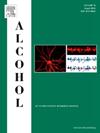酒精使用障碍在精神疾病中加剧临床和血管风险的差异。
IF 2.9
4区 医学
Q3 PHARMACOLOGY & PHARMACY
引用次数: 0
摘要
酒精使用障碍(AUD)是一个主要的公共卫生问题,对认知和神经功能有不利影响,但其对精神病学人群的影响仍未完全确定。在这项全球倾向评分匹配队列研究中,我们检查了多种精神疾病共病性酒精滥用的临床和血管后果。分析了来自TriNetX网络的数据,包括来自143个医疗保健组织的电子医疗记录。对于每一种疾病——焦虑、抑郁、双相情感障碍、精神分裂症、对严重压力的反应、饮食失调、人格障碍、精神活性物质依赖、发育障碍和强迫症——在控制人口统计学和临床因素的情况下,酒精滥用患者与非酒精滥用患者的比例为1:1。在1095天的随访中,评估的结果包括急诊就诊、疼痛发生率、死亡率和脑血管事件(短暂性脑缺血发作和中风)。在所有组中,酒精滥用始终与急诊使用率显著升高、躯体疼痛增加和死亡率升高相关。例如,焦虑和抑郁组的急诊次数分别增加8.1%和7.3%,死亡率分别增加2.7%和2.4%,而精神分裂症组的中风风险增加两倍,疼痛明显增加(风险比2.21)。这些结果强调AUD加剧了精神病患者的临床和血管风险,强调了有针对性干预的迫切需要。本文章由计算机程序翻译,如有差异,请以英文原文为准。
Alcohol use disorder exacerbates clinical and vascular risks differentially in psychiatric disorders
Alcohol Use Disorder (AUD) is a major public health concern with detrimental effects on cognitive and neurological function, yet its impact on psychiatric populations remains incompletely defined. In this global propensity score–matched cohort study, we examined the clinical and vascular consequences of comorbid alcohol abuse across diverse psychiatric disorders. Data from the TriNetX network, encompassing electronic medical records from 143 healthcare organizations, were analyzed. For each disorder—anxiety, depression, bipolar disorder, schizophrenia, reaction to severe stress, eating disorders, personality disorders, psychoactive substance dependence, developmental disorders, and obsessive-compulsive disorder—patients with alcohol abuse were matched 1:1 to those without, controlling for demographic and clinical factors. Over a 1095-day follow-up, outcomes evaluated included emergency department visits, pain prevalence, mortality, and cerebrovascular events (transient ischemic attacks and strokes). Alcohol abuse was consistently associated with significantly higher emergency care utilization, increased somatic pain, and elevated mortality across all groups. For instance, anxiety and depression cohorts exhibited 8.1% and 7.3% higher emergency visits and increased mortality by 2.7% and 2.4%, respectively, while schizophrenia showed a twofold increase in stroke risk and markedly higher pain (risk ratio 2.21). These results underscore that AUD exacerbates clinical and vascular risks in psychiatric patients, highlighting the urgent need for targeted interventions.
求助全文
通过发布文献求助,成功后即可免费获取论文全文。
去求助
来源期刊

Alcohol
医学-毒理学
CiteScore
4.60
自引率
4.30%
发文量
74
审稿时长
15.6 weeks
期刊介绍:
Alcohol is an international, peer-reviewed journal that is devoted to publishing multi-disciplinary biomedical research on all aspects of the actions or effects of alcohol on the nervous system or on other organ systems. Emphasis is given to studies into the causes and consequences of alcohol abuse and alcoholism, and biomedical aspects of diagnosis, etiology, treatment or prevention of alcohol-related health effects.
Intended for both research scientists and practicing clinicians, the journal publishes original research on the neurobiological, neurobehavioral, and pathophysiological processes associated with alcohol drinking, alcohol abuse, alcohol-seeking behavior, tolerance, dependence, withdrawal, protracted abstinence, and relapse. In addition, the journal reports studies on the effects alcohol on brain mechanisms of neuroplasticity over the life span, biological factors associated with adolescent alcohol abuse, pharmacotherapeutic strategies in the treatment of alcoholism, biological and biochemical markers of alcohol abuse and alcoholism, pathological effects of uncontrolled drinking, biomedical and molecular factors in the effects on liver, immune system, and other organ systems, and biomedical aspects of fetal alcohol spectrum disorder including mechanisms of damage, diagnosis and early detection, treatment, and prevention. Articles are published from all levels of biomedical inquiry, including the following: molecular and cellular studies of alcohol''s actions in vitro and in vivo; animal model studies of genetic, pharmacological, behavioral, developmental or pathophysiological aspects of alcohol; human studies of genetic, behavioral, cognitive, neuroimaging, or pathological aspects of alcohol drinking; clinical studies of diagnosis (including dual diagnosis), treatment, prevention, and epidemiology. The journal will publish 9 issues per year; the accepted abbreviation for Alcohol for bibliographic citation is Alcohol.
 求助内容:
求助内容: 应助结果提醒方式:
应助结果提醒方式:


